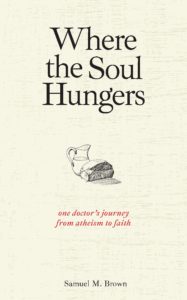Title: Where the Soul Hungers: One Doctor’s Journey from Atheism to Faith
Author: Samuel Brown
Publisher: BYU/Maxwell Institute/Deseret Book
Genre: Autobiographical essays
Year Published: 2021
Number of Pages:149
Binding: Paperback
ISBN: 978-1950304042
Price: $12.99
Reviewed by Dan Call for the Association for Mormon Letters
At a first glance, the subtitle of this collection of personal essays by Samuel Brown, One Doctor’s Journey from Atheism to Faith, might have created in me expectations for a ringing condemnation of academia and a personal narrative of a dramatic awakening. But anyone even slightly familiar with Brown’s style of writing knows already that there’s something else going on here. He takes stories and experiences so familiar as to be taken for granted and deftly reframes them (sometimes with help from sources you would least expect a Harvard-educated doctor to acknowledge), yielding fruitful results.
The essay, “Who’s My David?” explores what the shifting of perspectives in the David and Goliath story does to our conceit that, more often than not, we are the hero of the stories in which we appear. In “Your Socks Don’t Match,” Brown insists that a familiar miracle of Jesus, often recounted with piety or awe, is best understood when read with a sense of humor. In an act of great narrative vulnerability, Brown even puts his own memory on trial as he deconstructs a cherished recollection that propped up his ego for years. In every case, it’s clear that he’s motivated by an awareness and love for what these exercises do to his relation with God and neighbor.
The journey hinted at in the title isn’t a complete dramatic exodus from secularity into a realm of purely spiritual pursuits. Instead, what Brown describes is a shift in thinking and practice, an acknowledgment that our best epistemologies eventually come up short in their ability to explain or comfort. More than any huge epiphany or a near-death experience, what sticks in this collection is Brown’s ongoing realization that he inhabits a world populated with objects, stories, and activities that hint at deeper meanings, some of which he explores, others which he leaves for another day. He frequently meditates on illness, injustice, and mortality, while also comfortably noting he’s keeping company with gods and goddesses.
This hybridity is a challenging place to live in, but for Sam Brown, this is precisely the point of life: becoming comfortable with the improbable balancing act of being embodied while reaching for eternity, acknowledging divine impulses while not neglecting the anchor of the senses. This compact collection of fifteen essays delights with its originality while feeling colloquial enough so as to imagine that it’s being shared from a pulpit.

